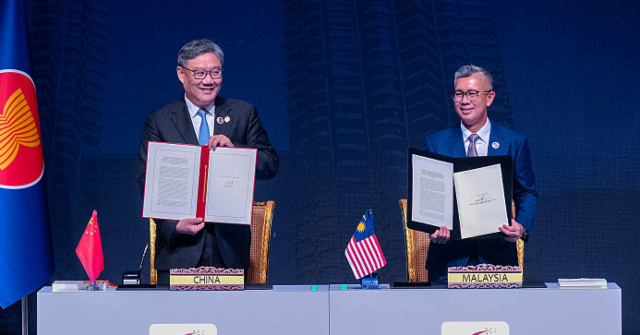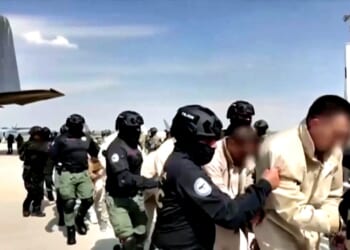The Association of Southeast Asian Nations (ASEAN) on Tuesday signed an “upgraded” free trade agreement with China.
The move was touted by Beijing as an acknowledgement of China’s growing power and influence across Southeast Asia.
Chinese Premier Li Qiang, who was present at the summit in Malaysia’s capital of Kuala Lumpur where the agreement was signed, said the 11 nations of ASEAN would benefit from “enhanced bilateral economic and trade cooperation” with China at a time when “many countries are facing greater development challenges after being unfairly subjected to steep tariffs” — a not-very-subtle shot at President Donald Trump’s trade policies.
“Interference by external forces in our region is rising, and many countries are being unreasonably subjected to high tariffs. Faced with strong political and economic bullying, disunity and confrontation will not only bring no benefits, but will lead to division and rule by external forces,” said Li.
“As the rules-based international trading system is facing severe challenges, the signing of the protocol to upgrade the China-Asean Free Trade Area to version 3.0 carries great significance,” the Chinese Ministry of Commerce said on Tuesday.
The ministry predicted the upgraded agreement would “inject greater confidence and momentum into regional and global economic growth, serving as an important example for countries to jointly resist protectionism and unilateralism and to tackle global trade challenges together.”
The original ASEAN-China Free Trade Agreement (ACFTA) was signed in 2002 and fully implemented in 2010. China and the ASEAN nations have over two billion residents combined. The volume of trade between China and the ASEAN nations grew from $235.5 billion to over $1 trillion in the 15 years since the agreement went into effect.
The agreement has been “upgraded” three times since then. Version 3.0 includes more provisions for green energy, which was seen as a big win for China because it manufactures solar panels, electric vehicles (EVs), and batteries on a massive scale.
One provision of the upgraded agreement calls for China and the ASEAN nations to collaborate on designing regulatory standards for EVs, which would surely be written to favor China’s EV industry.
President Donald Trump was in Kuala Lumpur for the ASEAN summit on Monday. He signed several deals with ASEAN nations and expressed confidence that he would be able to close a trade deal with China when he meets with Chinese dictator Xi Jinping in South Korea on Thursday.
The ACFTA 3.0 agreement was obviously China’s effort to push back against Trump’s visit and regain influence with the ASEAN nations, most of which would prefer to have good economic and diplomatic relations with both Beijing and Washington.
Malaysian Prime Minister Anwar Ibrahim was delighted to see both the U.S. and China making deals in Kuala Lumpur.
“The day before we were with President Donald Trump of the United States of America, and today we are back with China. And that reflects ASEAN centrality,” Ibrahim said after the meeting with China on Tuesday.
“This is what we consider steady engagement that fosters trust that enables us to work through challenges together,” he said.
A less cheerful note was sounded by ASEAN member Ferdinand Marcos, Jr., president of the Philippines. Marcos welcomed the upgraded free trade pact, but said China must also “commit to cooperation and meaningful engagement, especially in the South China Sea.”
Marcos said it was “regrettable” that China continues to seize territory in the South China Sea by force, using “dangerous actions and harassment.”
China attacked a Philippine fishing ship with a water cannon in the Spratly Islands two weeks ago, and both sides blamed each other for a subsequent collision between their ships. Marcos also denounced China for declaring it will build a “nature preserve” on land claimed by the Philippines in the Scarborough Shoal, in defiance of international arbitration rulings.
“Actions like these cannot hide under the veneer of marine environmental protection because they have no legal basis or effect, blatantly disregard international law, and infringe on the Philippines’ sovereignty,” Marcos said.


















